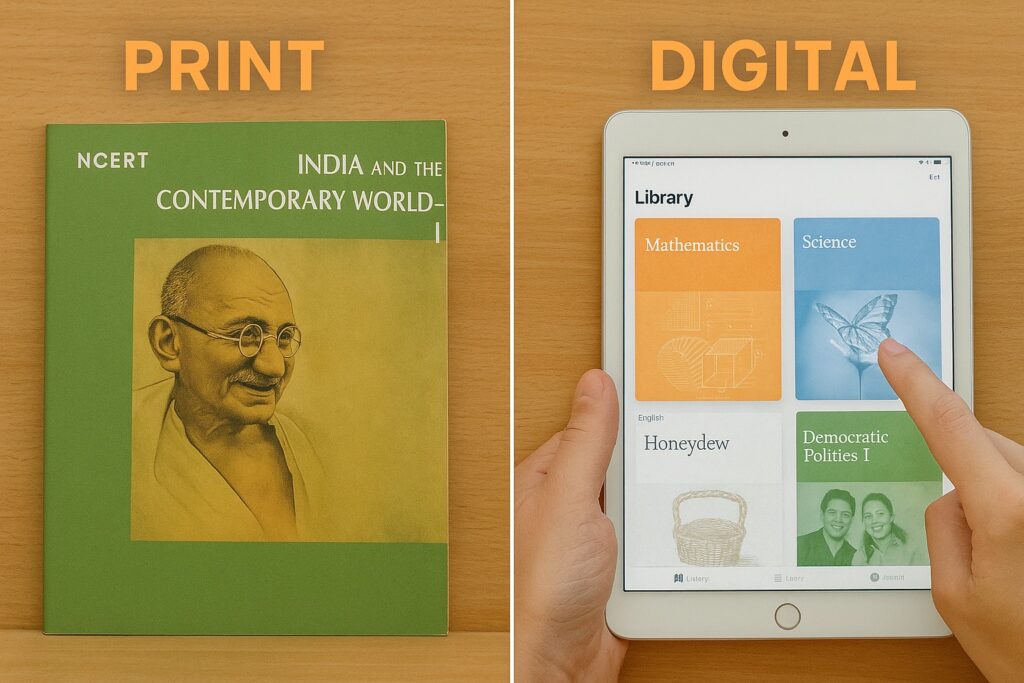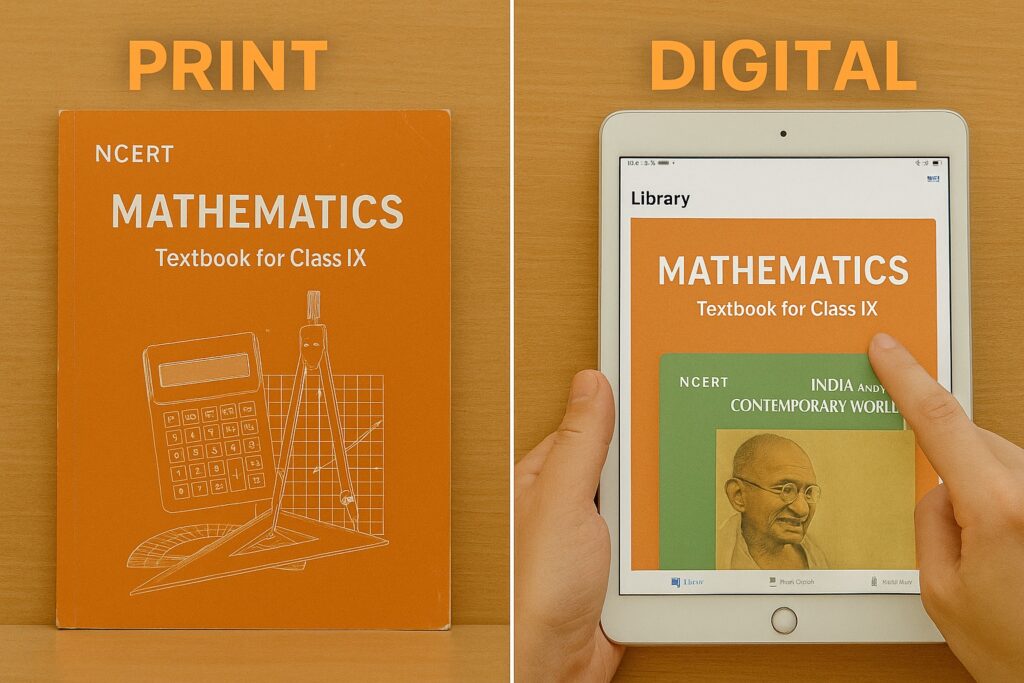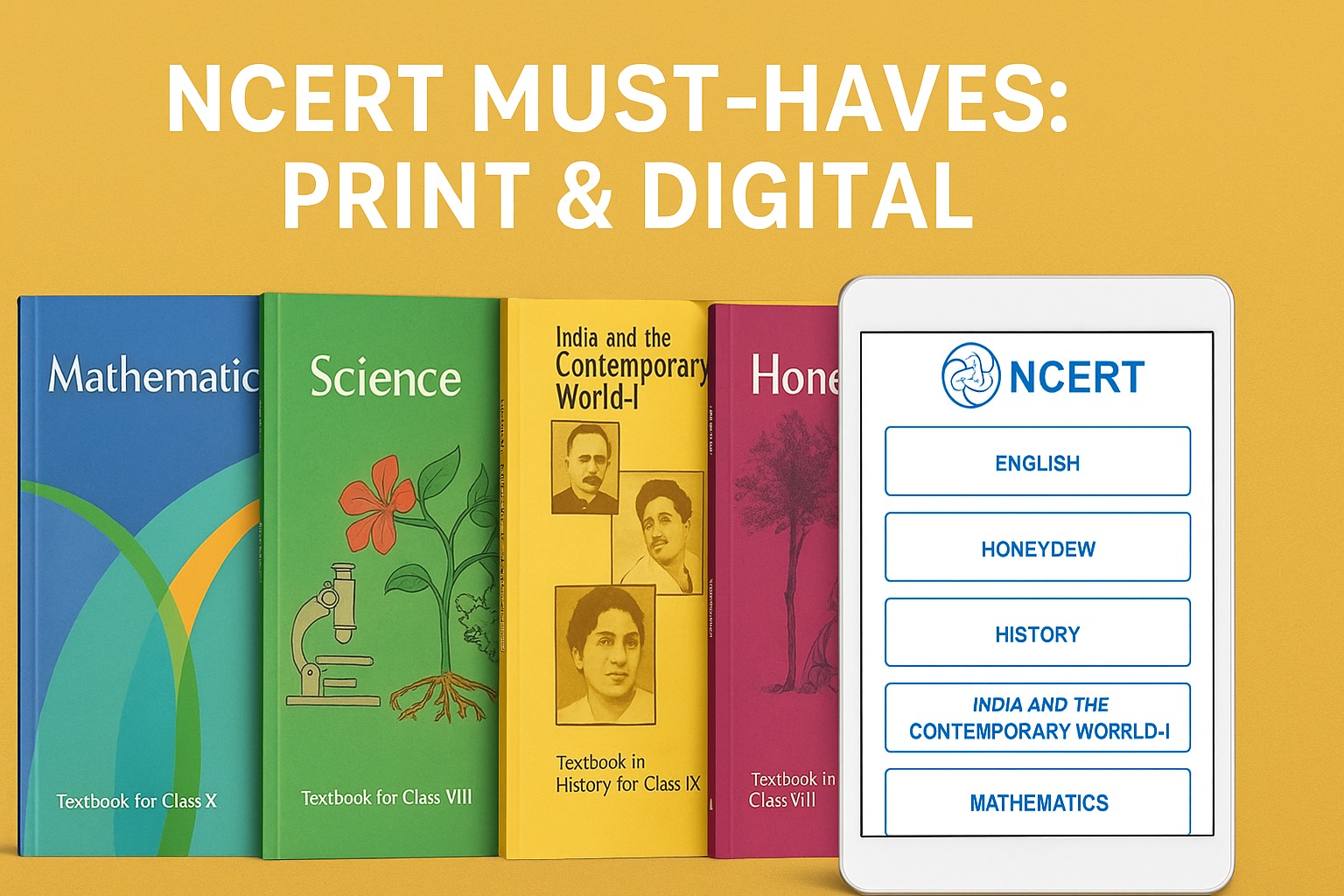Explore the importance of NCERT books for school and competitive exams in 2025. Get a complete list of NCERT must-haves in both print and digital formats. Perfect for UPSC, NEET, JEE aspirants and school students.
Whether you’re preparing for school exams, board exams, or competitive entrances like UPSC, NEET, or JEE, one thing remains common across the board, NCERT books. These books are not just simple textbooks; they are the foundation of conceptual clarity for millions of Indian students.
But in 2025, with digital tools becoming part of every student’s life, the question arises: should you still rely on the physical (print) versions, or should you go fully digital? Let’s dive deep into why NCERT books are essential, explore their impact on exam preparation, and then walk through a curated list of must-have NCERT books in both formats.

Why NCERT Books Are Still the Most Trusted Learning Resource
Ask any topper or serious aspirant, and you’ll hear the same advice: Start with NCERTs. But what makes these books so special even today?
1. Clarity Over Complexity
NCERT books are thoughtfully created by subject matter experts with one clear goal, to make learning easy and effective for students across all levels. These books are not just textbooks; they’re well-structured learning guides that simplify even the most complex topics. Whether you’re studying Class 6 Science or Class 12 Political Science, the content is presented in a way that builds understanding step by step.
What sets NCERT books apart is their clear and straightforward language, which makes it easier for students to grasp key concepts without getting overwhelmed. The explanations are clean, concise, and free of unnecessary jargon, making them ideal for both self-study and classroom learning. Each chapter follows a logical flow and includes questions, activities, and examples that encourage students to think critically and apply what they’ve learned.
Because of their conceptual accuracy and alignment with competitive exams like NEET, JEE, and UPSC, NCERT books are highly recommended by teachers, toppers, and coaching institutes alike. They lay the foundation for higher-level study and help students develop a strong command over the subject, one concept at a time.
🧠 “I switched to NCERTs for my UPSC prep after wasting weeks on bulky guides. Within a month, my basics were so clear that even optional subjects felt easier,” says Ruchi, a 24-year-old UPSC aspirant from Indore.
2. Board and Competitive Exams Aligned
From CBSE board exams to competitive tests like JEE Main, NEET, and UPSC Prelims, one thing remains constant, the importance of NCERT books. A large number of questions in these exams are either directly lifted from NCERT textbooks or are closely based on the concepts explained in them.
In CBSE board exams, questions are often framed straight from the NCERT syllabus, making it the most reliable source for scoring high marks. In competitive exams like NEET and JEE, foundational concepts in subjects like Physics, Chemistry, and Biology are extensively covered in NCERTs, and many factual and concept-based questions are taken word-for-word from these texts.
Similarly, for UPSC Prelims, especially in subjects like Indian Polity, History, Geography, and Science, a solid understanding of NCERT content is crucial. The exam often tests clarity of basic concepts, and that’s exactly what NCERTs offer, well-structured, easy-to-understand explanations without unnecessary complexity.
So, skipping NCERTs or treating them casually could mean missing out on easy and scoring questions. In an exam where every mark matters, NCERTs are not just helpful, they’re essential.

3. Visual Learning Support
One of the standout features of NCERT books is their use of diagrams, infographics, charts, and real-world examples to make learning more interactive and easier to understand. These visual aids aren’t just decorative, they play a crucial role in helping students grasp complex concepts more quickly and retain them longer.
For subjects like Geography, Science, and Biology, where understanding structures, processes, and spatial relationships is essential, NCERT books use clear and well-labeled illustrations that simplify difficult topics. For example:
- In Geography, maps and diagrams help students visualize landforms, climate patterns, and human activities.
- In Science, especially Physics and Chemistry, charts and step-by-step diagrams explain experiments, circuits, and reactions.
- In Biology, detailed illustrations of cells, organs, and systems allow students to understand anatomy and physiological functions better.
These visuals not only break down complicated information but also make revision faster and more effective. For visual learners especially, they serve as memory anchors, making it easier to recall information during exams.
In short, the thoughtful use of visuals in NCERTs transforms passive reading into active learning, making them an excellent tool for conceptual clarity and exam preparation.
4. Updated & Standardized
Unlike many commercial guidebooks that may contain factual errors, inconsistencies, or outdated content, NCERT books are carefully curated and reviewed by subject matter experts and education professionals appointed by the National Council of Educational Research and Training. These books go through multiple rounds of scrutiny and are designed to align with the latest curriculum and educational standards.
This makes NCERTs one of the most reliable and accurate resources available for students, especially those preparing for competitive exams like JEE, NEET, UPSC, and board exams. The content is not only conceptually sound but also free from unnecessary clutter or biased perspectives.
With regularly updated editions and a focus on conceptual understanding, NCERT books ensure students are learning the most relevant and error-free material, which builds a strong and dependable academic foundation.
Print vs Digital: Which NCERT Format Is Right for You?

Print (Hardcopy) Benefits:
- Ideal for note-taking and highlighting important content.
- Great for offline reading and zero screen-time.
- Preferred during long study sessions where screen fatigue sets in.
- Better for memory retention according to various educational psychology studies.
Digital (PDF/E-book) Benefits:
- Lightweight and accessible on mobile/tablet/laptop.
- Easy to search content or keywords quickly.
- Can be combined with apps like Notion or OneNote for efficient revision.
- Ideal for students with limited access to bookstores.
🎓 “I keep the printed version at home for weekend reading, and use PDFs during college travel or last-minute revisions,” shares Aakash, a B.Tech student in Pune.
NCERT Must-Haves – Book List
Here’s a carefully curated list of NCERT books every student (school or competitive exam aspirant) must own. You can find them on NCERT’s official website, Amazon, Flipkart, or local bookshops.
Useful NCERT Books for Different Exams
| Exam | Subjects | Recommended NCERT Books |
|---|---|---|
| UPSC (IAS) | History, Geography, Polity, Economy, Science | – History (Class 6–12) |
- Geography (Class 6–12)
- Economics (Class 9–12)
- Political Science (Class 9–12)
- Science (Class 6–10)
- Sociology (Class 11–12)
- Art & Culture (Fine Arts Class 11) |
| NEET | Biology, Physics, Chemistry | – Biology (Class 11–12) - Chemistry (Class 11–12)
- Physics (Class 11–12) |
| JEE (Main/Adv) | Physics, Chemistry, Math | – Physics (Class 11–12) - Chemistry (Class 11–12)
- Mathematics (Class 11–12) |
| SSC (CGL/CHSL) | Science, Geography, Economy, Polity, History | – General Science (Class 6–10) - History, Geography, Polity, Economics (Class 6–10) |
| CDS/NDA | Science, Geography, History, Polity | – Science (Class 6–10) - Geography, Polity, History (Class 6–10) |
| State PSCs | History, Polity, Geography, Economy, Science | – NCERTs from Class 6–12 for all major humanities and science subjects are highly recommended. |
💡 Pro Tip: UPSC and NEET aspirants must revise Class 6–12 NCERTs at least 2–3 times before moving to advanced books.

How to Use NCERTs Effectively – A Simple Strategy
- Start with Class 6 to 10 Books
Ideal for subjects like Science, Geography, and Civics. These lay the groundwork even for higher exams. - Make Summary Notes
After reading a chapter, note down key points. Don’t rely on memory. - Solve In-Text and Exercise Questions
They often repeat in board exams and prelims of competitive tests. - Revise with Digital Format
Use digital PDFs to revise quickly while commuting or during free time.
Conclusion:-
Whether you’re a Class 9 student finding math a bit tricky, a NEET aspirant diving deep into Biology, or a UPSC hopeful trying to understand Indian Polity, NCERT books are the perfect starting point. They’re designed to build strong foundational concepts, something every student needs, no matter the exam.
With both print and digital versions now available, you have the flexibility to choose what works best for your learning style and routine. Use them wisely, read thoroughly, revise regularly, and stay consistent.
Remember, don’t just collect books for the sake of it. Focus on truly understanding the basics first, and the advanced stuff will become much easier to grasp later on.
🧾 Coming Soon: We’ll link each book above with its best Amazon & Flipkart versions in the next update. Stay tuned.

